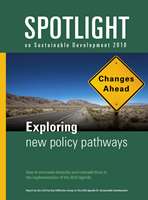Published on Thu, 2019-05-09 20:14
The Palestinian Non Governmental Organizations Network (PNGO) calls upon the international community to immediately pressure the Israeli occupying forces to stop attacks on the Gaza Strip. PNGO condemns the Israeli occupying forces continuous barbaric attack on Palestinian civilians especially children, women, civilian homes, cultural institutions and media outlets. Urgent Call for Action PNGO calls upon the international community to immediately pressure the Israeli occupying forces to stop attacks on the Gaza Strip Palestinian Non Governmental Organizations Network (PNGO) condemns the Israeli occupying Forces continuous barbaric attack on Palestinian civilians especially children, women, civilian homes, Cultural institutions and media outlets. |
Published on Wed, 2019-05-08 21:02
Diversification, in addition to an effective risk management strategy, remains crucial for commodity-dependent developing countries in order to increase resilience and reduce macroeconomic risks related to the commodity sector. This is one of the main conclusions highlighted by the UN Conference on Trade and Development (UNCTAD) in a Secretariat Note presented at the eleventh session of the multi-year expert meeting on commodities and development. |
Published on Tue, 2019-05-07 20:26
The 2030 Agenda represents a paradigm shift in terms of universality and interlinked goals, including across borders and affirms the need for a rights-based approach to peace and security, one focused on prevention. At the same time, most governments are still producing, trading and spending more on arms, thereby fueling a militarized approach to peace and security. Dominant power talks on how to achieve peace continue to silence those impacted most by conflicts and wars, including women and children. Profits made under war economies and through the arms trade continue to deepen inequalities and violate the rights of those with enormous humanitarian and development needs. |
Published on Fri, 2019-04-12 09:30
From Puerto Rico, the women's organization Cohitre also describes a “colonial condition that imposes agendas foreign to our people”. In September 2017 hurricanes Irma and Maria hit the island, destroying 70,000 homes and collapsing its electric network (still not completely restored), its transport system, hospitals and fuel and food supplies. The catastrophic effects are sharpened by the absence of political powers -the island is a US 'unincorporated territory' since 1898- and the control of its finances by a US-imposed Fiscal Control Board, due to its indebtedness. “The diversion of funds to pay off public debt, adjustment plans, austerity measures, the reduction of the public sector and privatization has compromised the government's capacity to respond to the crisis” while “the response of the US government is slow, erratic and centralized” and “the US Congress has shown no rush to provide aid to Puerto Rico, given the debate over corruption and how to manage the funds”. |
Published on Fri, 2019-04-12 09:27
The Government of India presented its first Voluntary National Review (VNR) report on Implementation of the Sustainable Development Goals (SDGs) to United Nations in 2017. Despite VNR guidelines urging countries to inform on “progress and status of all SDGs”, India reported on only seven goals. This is surprising as India’s VNR claimed its national development goals are “mirrored in the SDGs” and as Government had asserted 11 of 17 SDGs were already being worked on even before the SDGs were adopted. Given the consensus that SDGs’ success largely depends on India’s achieving them, an appraisal of its performance in critical social sectors, including those associated with the SDGs left out of VNR, becomes necessary. |
SUSCRIBE TO OUR NEWSLETTER







